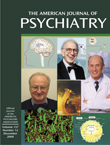Attempted Suicide and Alcoholism in Bipolar Disorder: Clinical and Familial Relationships
Abstract
OBJECTIVE: This study examined the clinical and familial relationships between comorbid alcoholism and attempted suicide in affectively ill relatives of probands with bipolar I disorder. METHOD: In 71 families ascertained for a genetic linkage study, 337 subjects with major affective disorder were assessed by using the Schedule for Affective Disorders and Schizophrenia—Lifetime Version. RESULTS: Subjects with bipolar disorder and alcoholism had a 38.4% lifetime rate of attempted suicide, whereas those without alcoholism had a 21.7% rate. Attempted suicide among subjects with bipolar disorder and alcoholism clustered in a subset of seven families. Families with alcoholic and suicidal probands had a 40.7% rate of attempted suicide in first-degree relatives with bipolar disorder, whereas other families had a 19.0% rate. CONCLUSIONS: Comorbid alcoholism was associated with a higher rate of attempted suicide among family members with bipolar disorder. Attempted suicide and alcoholism clustered in a subset of families. These relationships may have a genetic origin and may be mediated by intoxication, mixed states, and/or temperamental instability.



